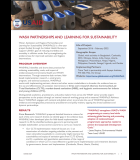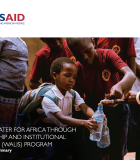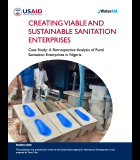Leadership, Empowerment, Advocacy, and Development Project (LEAD)
Corruption remains the bane of good governance in Nigeria. Poor governance has impoverished the Nigerian masses, created a gulf between the haves and have-nots, and completely eroded the provision of basic social services including education, healthcare, and economic infrastructure. State and local governments that are responsible for the provision of these services are neither equipped nor prepared to carry out their responsibilities. Citizens lack the capacity to articulate their needs or hold their government accountable. Modalities for disbursement of funds and the management of such funds are not standardized across states and local governments. All these leave a wide gap in fiscal transparency thereby enriching corrupt government officials.
To address these issues, USAID/Nigeria created a strategy to increase access to quality social services. The strategy called for engagement with state and local governments, civil society, and the private sector. Approaches included:
- Build the capacity of key officials to plan, budget, track, manage and evaluate their fiscal and administrative responsibilities
- Reinforce policies and systems to improve transparency
- Mobilize civil society and the private sector to participate in community planning and budgeting, monitoring, financial flows and assess the quality of services rendered
- Assist civil society groups to hold elected officials responsible for their actions
Activity Description
The goal of the LEAD project was to improve local governance by working with state and local governments to:
- Strengthen capacity of governments to build better relations with communities, promote effectiveness and strengthen management capacity of service departments. The LEAD project worked with state governments on legislative changes that provide more citizens access to information on local decision making.
- Increase transparency of local government operations through a more participatory budget process based on sound analysis of services and revenue potential; strengthen the capacity of state governments to monitor budget expenditures and promote greater transparency in local government. The LEAD project worked to bring constitutionally mandated Fiscal Responsibility and Public Procurement Laws to the local government level.
- Strengthen the organizational and service capacity of a broad range of organizations at the state and local level for service planning, budgeting and monitoring.
- Service improvements in health and education through collaboration with other FSS projects and support LGA in selected services such as water and sanitation.
The LEAD project’s development hypothesis was that by addressing both the demand and supply side of local government service, accountability and development will be strengthened, which made the system work more effectively through partnership building.





